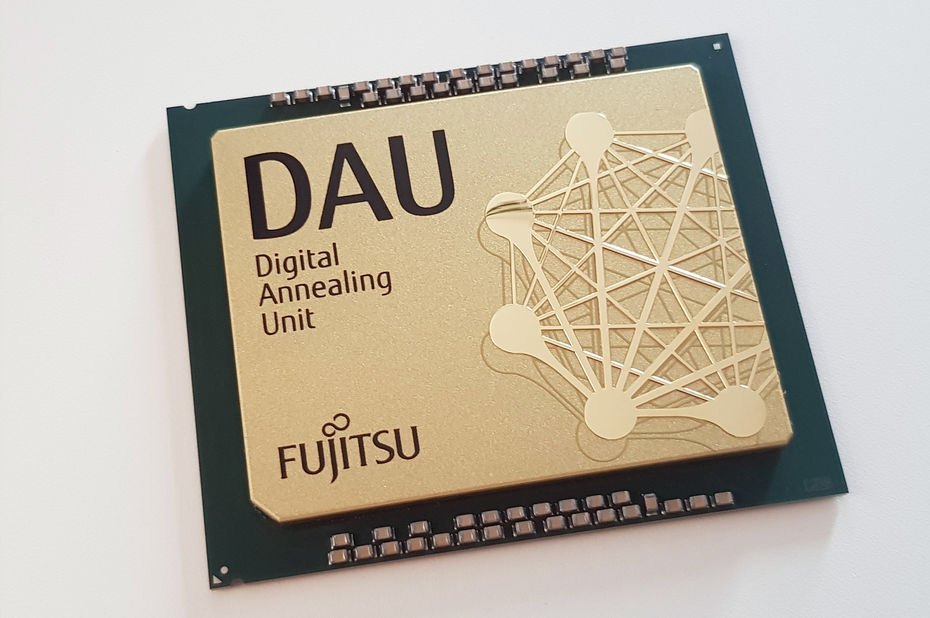What is Digital Annealer?

Digital Annealer, known as DA, is a computer architecture developed to rapidly solve large-scale combinatorial optimization problems using CMOS digital technology. Jointly developed by the University of Toronto and Fujitsu Laboratories Ltd. in Japan, DA is unique in that it uses a digital circuit design inspired by quantum phenomena and can solve problems that are very difficult and time-consuming or even impossible for classical computers to address.
Combinatorial optimization refers to the process of finding the most favourable set of solutions for a problem with discrete variables and has applications in fields such as healthcare and machine learning. A significant challenge with combinatorial optimization is the sheer number of variables involved and the inability of today’s classical computers to process this incredible amount of data. Compared to deterministic and heuristic methods, DA can obtain better solutions in less time, while rivaling quantum computer performance at a fraction of the cost.
How does Digital Annealer work?
Digital Annealer is inspired by quantum mechanics, but unlike quantum computers, does not require cryogenic temperatures. DA makes use of a method called annealing, which is named after the annealing process using in metallurgy. During this procedure, metal is heated to a high temperature before the structure stabilizes as it is slowly cooled to a lower energy, more stable state.
Using the analogy of placing blocks in a box, in the classical approach, the blocks are placed in sequence. If a solution is not found, the process is restarted and repeated until a solution is found. With the annealing approach, the blocks are placed randomly and the entire system is “shaken.” As the shaking is gradually reduced, the system becomes more stable as the shapes quickly fit together.


DA is designed to solve fully connected quadratic unconstrained binary optimization (QUBO) problems and is implemented on CMOS hardware, with the current ability to solve problems of up to 1024 variables. Its algorithm is based on simulated annealing, but also takes advantage of massive parallelization enabled by the custom application-specific CMOS hardware.
What applications can Digital Annealer be used for?









…And many more!
Digital Annealer News and Links
2019
- October 21: Fujitsu, SMU, and A*STAR Launch Digital Platform Experimentation Project Using Quantum-Inspired Computing and Deep Learning Technology
- September 20: Fujitsu and PeptiDream Leverage Quantum-Inspired Tech in Joint Research to Accelerate Drug Discovery
- August 29: Fujitsu Quantum-Inspired Digital Annealer Delivers Securitization Optimization for Main Incubator
- July 19: Fujitsu Harnesses Quantum-Inspired Digital Annealer Technology to Optimize Output Efficiency in Power Generation for Renewable Energy Devices
- May 15: Businesses Can’t Wait Any Longer for Quantum Computing, Fujitsu Study Confirms
- March 7: Fujitsu Digital Annealer Revolutionizes Problem Solving with Quantum Acceleration
- January 15: Fujitsu and TC3 Promote Quantum Inspired Digital Annealer Next-Generation Architecture in Topcoder Contest
2018
- December 21: Fujitsu Launches Next Generation Quantum-Inspired Digital Annealer Service
- October 2: Fujitsu Drives Quantum-Inspired Project to Help Solve NatWest’s Complex Optimization Challenges
- September 19: Fujitsu Laboratories and Waseda University Agree to Comprehensively Collaborate on Digital Annealer Research
- September 18: Fujitsu Technology to Solve Combinatorial Optimization Problems for Medium-Sized Drug Discovery
- May 15: Fujitsu Quantum-Inspired Digital Annealer Cloud Service to Rapidly Resolve Combinatorial Optimization Problems
- March 16: Fujitsu President Leads Global Delegation to U of T to Launch Collaborative Research Lab
- March 15: Fujitsu Visits U of T Engineering to Launch Collaborative Research Lab
- January 29: Fujitsu Initiates Joint Research with Recruit Communications on Marketing Technologies Using “Digital Annealer”
2017
- September 20: U of T Attracts Fujitsu Laboratories R&D Centre to Toronto
- September 20: Fujitsu Laboratories and University of Toronto Enter Strategic Partnership
- September 20: Fujitsu Technology Facilitates Application of Combinatorial Optimization Methods to Real-World Problems
